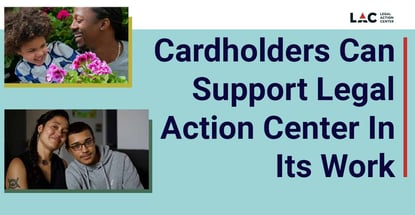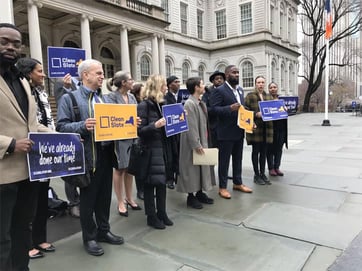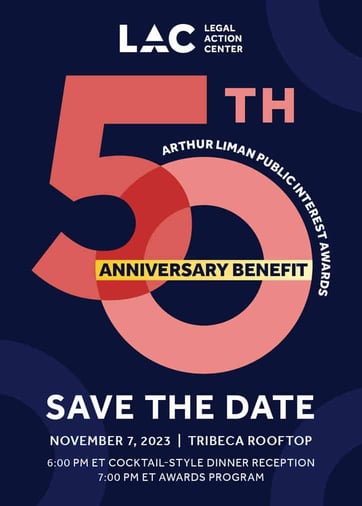
Our experts and industry insiders blog the latest news, studies and current events from inside the credit card industry. Our articles follow strict editorial guidelines.
In a Nutshell: Since 1973, the Legal Action Center has been fighting discrimination and creating opportunities for people returning to society after being incarcerated. It also advocates for individuals with stigmatized health conditions, including addiction, mental illness, and HIV/AIDS. The Legal Action Center supports programs that break the cycle of incarceration and recidivism. Donations allow the Legal Action Center to continue its unrelenting efforts and expand its programs, which create healthier and stronger communities across the country.
A healthy community comprises healthy individuals. If even one member of a community isn’t healthy, then the community as a whole can suffer.
Doctors, educators, and firefighters are examples of professions that are charged, whether directly or indirectly, with helping a community stay healthy and vibrant. The criminal justice system also plays an important role in maintaining a community’s health.
Individuals who are found guilty of breaking the law may be sentenced to a period of time in prison. They may experience struggles when reentering society after their incarceration has ended. Discrimination toward this group can compound their difficulties. Resources and programs designed to aid their reentry into society not only benefits formerly incarcerated people, but it strengthens the overall communities in which they live.
The Legal Action Center has fought discrimination and restored opportunities for people impacted by the criminal justice system over the past 50 years. During this time, the Legal Action Center has also worked to build health equity, particularly for people with mental illness, substance use problems, and HIV/AIDS.

“Decades of punitive criminal justice and drug policies have led to over-incarceration and a failure to invest in community health care,” says Arianne Keegan, Legal Action Center’s Director of Communications. “This has devastated individual lives and entire communities, and has perpetuated systemic inequities on a massive scale.”
Legal Action Center provides direct legal services and advocates for policies to build health equity among historically marginalized groups and ensure justice for all. In addition to providing free legal help individuals who are directly impacted by discrimination, LAC also offers training and technical assistance to support fellow advocates, and engages in impact litigation to set legal precedents.
“We’ve continuously built upon our accomplishments,” says Keegan, “while remaining true to our core values of humanity, compassion, and justice.”
Helping Individuals Thrive After Incarceration
One-third of American citizens have some form of criminal record, and the disproportionate impact on low-income individuals of color is unmistakable, said Keegan. Laws can hinder people with criminal records from accessing basic necessities, including employment, housing, and education. Keegan said these factors make it difficult for those with criminal records to escape poverty.
“There are millions of Americans who cannot access or afford the health care they need,” Keegan adds. “Individuals with substance use problems and mental illness are often criminalized instead of treated due to the lack of affordable, accessible treatment options and discrimination pervading our health, insurance, and legal systems.”
One of LAC’s main priorities is the promotion of a strategy called Medicaid reentry to help people successfully reenter the community from jail or prison by ensuring they have equitable access to quality healthcare. Many individuals returning to their community following incarceration have higher rates of chronic diseases such as high blood pressure compared to the general public. Rates of mental illness and substance use are also higher among this group, making health care accessibility and affordability essential.

Medicaid reentry, which Legal Action Center first conceived over a decade ago in New York State, enables states to use federal Medicaid funds to pay for transitional health care services as people leave prison and return to their homes and communities. In early 2023, California was the first state approved for Medicaid reentry.
Another key program for the Legal Action Center is the Clean Slate NY campaign. It’s a member of the campaign’s steering committee and has long been fighting for passage of the Clean Slate Act in the state, which would allow for eligible criminal records to be sealed and individuals to obtain jobs, homes, and educational opportunities without the stigma of an old record holding them back.
“We are thrilled that both the State Senate and Assembly have passed the bill and urge the Governor to act quickly and sign this bill into law,” explains Keegan. “Once that occurs, we can begin the important work of public education and ensuring proper implementation to effectively usher in a new era of opportunity for millions of New Yorkers.”
Donations Fuel Legal Action Center’s Expanding Impact
The Legal Action Center’s work is funded by donations. It receives a broad base of support from a variety of sources including corporations, foundations, government agencies, individuals, and through its annual benefit event, the Arthur Liman Public Interest Awards Benefit. In 2023, the Legal Action Center will be celebrating its 50th anniversary at the benefit.
The Legal Action Center generates additional revenue through the publications it produces, member fees, and in-kind contributions. Program funding through donations has grown over the past decade, raising over $1.5 million per year.
Keegan attributes this success to the efforts of the Legal Action Center’s board of directors, who play a pivotal role in fundraising. Its board of directors is mainly composed of leaders in the health, justice, and legal fields.

Additional financial support is crucial to advance the Legal Action Center’s mission. Online donations are accepted and can be made through bank transfers, credit cards, or PayPal.
“With increased financial support, we can continue our robust and unrelenting fight against discrimination for the next 50 years to come,” says Keegan. “Our deep expertise and unmatched track record of success uniquely positions us to meet the many intersecting and complex challenges that lie ahead. Our anniversary campaign aims to raise $3 million with the goal of expanding our work and impact.”
Keegan said the anniversary campaign donations will support improving access to addiction and mental health care and restoring justice and opportunities, among other areas. Impact litigation to establish important legal precedents that protect people with conviction records and/or substance use disorders against discrimination will also be supported by these funds.
Beyond financial contributions, there are several other ways to contribute to the Legal Action Center. Individuals can attend Legal Action Center events and training programs, sign up to receive its monthly newsletter, and follow LAC on social media to stay up to date and easily share their latest information.
Remaining Steadfast After 50 Years of Success
The Legal Action Center has accomplished a great deal over the past half century. Its goals and aspirations indicate it has no plans of slowing down.
“As we reflect on how far we’ve come,” Keegan says, “we’re also looking forward to our impact over the next 50 years.”
Challenging systemic human and civil rights violations and expanding protections for people and families impacted by the criminal legal system, addiction, and other stigmatized health conditions will continue to be a primary goal for the center in the near future, said Keegan. Increasing access to health care services will also be an area of focus, particularly for addiction and mental health care where demand for services exponentially outpaces supply.
The Legal Action Center measures its progress in a variety of ways to ensure it stays on course and uses its time and resources effectively.
Keegan said the center’s success is reflected in the sheer number of cases it resolves, training programs it offers, favorable litigation outcomes it garners, and legislative and policy successes it achieves. Achievements in these areas can be tracked through the years. Other measures of Legal Action Center’s impact are not as easily quantifiable.
“The most telling indicators of our impact are the testimonials, feedback, and positive updates we receive from our clients and their families,” Keegan says. “We also hear expressions of gratitude for our work from coalition partners, policymakers, fellow advocates, and community members across the country. It’s our great privilege to work with all of these stakeholders to build a healthier, more just, and equitable society for all of us.”





![6 Easy Approval Cash Advance Loans ([updated_month_year]) 6 Easy Approval Cash Advance Loans ([updated_month_year])](https://www.cardrates.com/images/uploads/2020/10/shutterstock_1693980259--1.jpg?width=158&height=120&fit=crop)
![[current_year] Cash Advance Limits by Issuer ([updated_month_year]) [current_year] Cash Advance Limits by Issuer ([updated_month_year])](https://www.cardrates.com/images/uploads/2020/12/shutterstock_2980733.jpg?width=158&height=120&fit=crop)
![7 Cash Advance & Personal Loans For No Credit ([updated_month_year]) 7 Cash Advance & Personal Loans For No Credit ([updated_month_year])](https://www.cardrates.com/images/uploads/2021/05/Cash-Advance-Personal-Loans-For-No-Credit.jpg?width=158&height=120&fit=crop)
![Best Cash Advance Credit Cards of [updated_month_year] Best Cash Advance Credit Cards of [updated_month_year]](https://www.cardrates.com/images/uploads/2021/09/Best-Cash-Advance-Credit-Cards.jpg?width=158&height=120&fit=crop)
![7 Cash Advance Loans For Bad Credit ([updated_month_year]) 7 Cash Advance Loans For Bad Credit ([updated_month_year])](https://www.cardrates.com/images/uploads/2021/11/Cash-Advance-Loans-For-Bad-Credit.jpg?width=158&height=120&fit=crop)